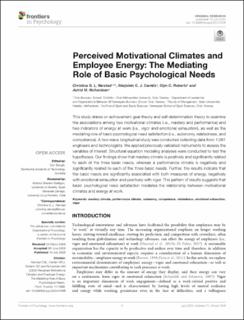| dc.contributor.author | Nerstad, Christina G. L. | |
| dc.contributor.author | Caniëlis, Marjolein | |
| dc.contributor.author | Roberts, Glyn C. | |
| dc.contributor.author | Richardsen, Astrid Marie | |
| dc.date.accessioned | 2021-03-19T19:32:45Z | |
| dc.date.available | 2021-03-19T19:32:45Z | |
| dc.date.created | 2020-06-11T13:01:52Z | |
| dc.date.issued | 2020 | |
| dc.identifier.citation | Frontiers in Psychology. 2020, 11(2020), Artikkel 1509. | en_US |
| dc.identifier.issn | 1664-1078 | |
| dc.identifier.uri | https://hdl.handle.net/11250/2734574 | |
| dc.description | This is an open-access article distributed under the terms of the Creative Commons Attribution License (CC BY). The use, distribution or reproduction in other forums is permitted, provided the original author(s) and the copyright owner(s) are credited and that the original publication in this journal is cited, in accordance with accepted academic practice. No use, distribution or reproduction is permitted which does not comply with these terms. | en_US |
| dc.description.abstract | This study draws on achievement goal theory and self-determination theory to examine the associations among two motivational climates (i.e., mastery and performance) and two indicators of energy at work (i.e., vigor and emotional exhaustion), as well as the mediating role of basic psychological need satisfaction (i.e., autonomy, relatedness, and competence). A two-wave longitudinal study was conducted collecting data from 1,081 engineers and technologists. We applied previously validated instruments to assess the variables of interest. Structural equation modeling analyses were conducted to test the hypotheses. Our findings show that mastery climate is positively and significantly related to each of the three basic needs, whereas a performance climate is negatively and significantly related to each of the three basic needs. Further, the results indicate that the basic needs are significantly associated with both measures of energy, negatively with emotional exhaustion and positively with vigor. This pattern of results suggests that basic psychological need satisfaction mediates the relationship between motivational climates and energy at work. | en_US |
| dc.language.iso | eng | en_US |
| dc.subject | mastery climate | en_US |
| dc.subject | performance climate | en_US |
| dc.subject | autonomy | en_US |
| dc.subject | competence | en_US |
| dc.subject | relatedness | en_US |
| dc.subject | emotional exhaustion | en_US |
| dc.subject | vigor | en_US |
| dc.title | Perceived motivational climates and employee energy: The mediating role of basic psychological needs | en_US |
| dc.type | Peer reviewed | en_US |
| dc.type | Journal article | en_US |
| dc.description.version | publishedVersion | en_US |
| dc.rights.holder | © 2020 Nerstad, Caniëls, Roberts and Richardsen | en_US |
| dc.source.pagenumber | 14 | |
| dc.source.volume | 11 | en_US |
| dc.source.journal | Frontiers in Psychology | en_US |
| dc.source.issue | 2020 | en_US |
| dc.identifier.doi | 10.3389/fpsyg.2020.01509 | |
| dc.identifier.cristin | 1815045 | |
| dc.description.localcode | Institutt for idrett og samfunnsvitenskap / Department of Sport and Social Sciences | en_US |
| dc.source.articlenumber | 1509 | en_US |
| cristin.ispublished | true | |
| cristin.fulltext | original | |
| cristin.qualitycode | 2 | |
